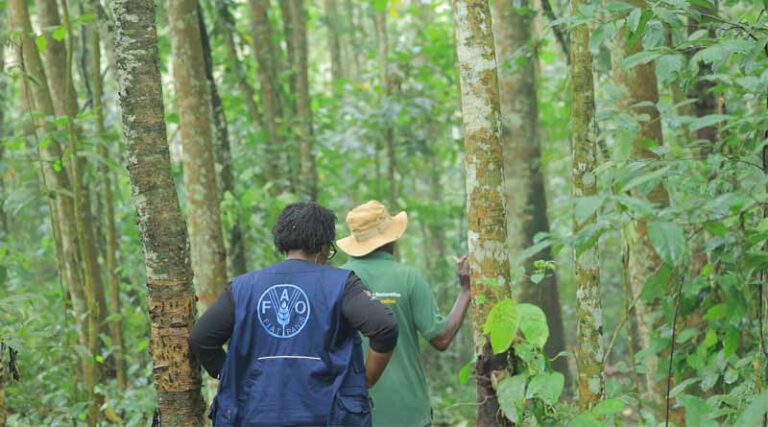
Uganda Secures $31 Million From Green Climate Fund For Africa’s First Results-based Climate Project
29 October 2025, Rome: The Green Climate Fund (GCF) has approved a $31 million grant-based payment for a landmark climate project in Uganda, recognizing the country’s tangible achievements in curbing deforestation and reducing greenhouse gas emissions.
This is the first results-based payment project approved by the GCF Board for Uganda, and for Africa, and also for a Least Developed Country (LDC) marking a milestone in climate action for the continent.
The Food and Agriculture Organization of the United Nations (FAO), as Accredited Entity acting on behalf of the Government of Uganda, presented the project “Uganda REDD+ Results-Based Payment for Emission Reductions (2016–2017)” at the forty-third meeting of the GCF Board held from 27 to 30 October in Songdo, Republic of Korea.
The payout recognizes that Uganda’s targeted efforts at sustainable forest management slashed net emissions by the equivalent of more than 8 million tonnes of CO₂ between 2016 and 2017. That’s roughly the same as growing 133 million tree seedlings for 10 years.
“The GCF’s funding approval shows how results-based finance can reward effective climate action and deliver benefits for people and nature, and is a recognition of Uganda’s efforts and achievements,” said FAO Director-General QU Dongyu. “It also demonstrates how early investments in readiness and capacity building can yield transformative results for forests, food security, and communities, and is an important milestone for Africa.”
Preserving forests for food security
Uganda’s forests cover about 2.36 million hectares, providing critical ecosystem services, regulating the climate, and supporting livelihoods. At the same time, 90 percent of forest loss in the country is driven by agricultural conversion for crops such as cassava and cattle.
REDD+, standing for reducing emissions from deforestation and forest degradation and the conservation and enhancement of forest carbon stocks, is a voluntary climate mitigation framework developed by the UNFCCC. Deforestation and forest degradation account for around 11 percent of global emissions.
“The Revenue from the REDD+ Results is part of Uganda’s ambitious mobilization of Climate Finance, and it clearly shows how patience in this space of strategic importance pays off,” said Uganda Permanent Secretary, Ministry of Water and Environment Alfred Okot Okidi, welcoming the GCF decision.
Projects under the results-based payment scheme such as the one copiloted by the Government of Uganda and FAO are a proven cost-effective tool to achieve mitigation results. FAO has supported four other countries to access such GCF funding – in Argentina, Chile, Colombia and Papua New Guinea – worth $237 million
FAO will work with the Government of Uganda to channel the $31 million GCF disbursement into achieving further goals that can relieve pressure on ecosystems and secure further REDD+ benefits and promote local food security. The holistic approach also helps with catalyzing more income opportunities, strengthening governance, bolstering land tenure and contributing to better rural livelihoods.
For example, community-based pole and timber plantations will reduce the distances rural women must walk to collect firewood, while collective forest management and land rights agreements will help reduce conflicts and foster a sense of ownership. A robust Benefit Sharing System will also ensure equitable access to forest resources, particularly for Forest Dependent Indigenous Peoples and other vulnerable and marginalized groups such as women.
Aligned partnerships and a strategic investment in Uganda’s climate future
FAO has been involved in the Uganda project from the outset and helped the country implement a comprehensive REDD+ readiness phase, laying the foundation for a socially and environmentally viable national strategy, and progressed with concrete policies and actions to reduce deforestation towards the results achieved.
The new project is aligned with Uganda’s National REDD+ Strategy and Action Plan, supports the country’s Nationally Determined Contributions (NDCs) under the Paris Agreement., and consolidates Uganda’s efforts to create a nationally coordinated, scalable model for climate resilience, biodiversity conservation, and sustainable development.
The total value of the FAO-GCF portfolio currently amounts to $1.8 billion, with 114 readiness grants – including 38 in Africa – and 29 investment projects in place worldwide serving more than 60 million people.
Also Read: Another Myth Busted: John Deere has not “Gutted” its Iowa Factories
📢 If You’re in Agriculture, Make Sure the Right People Hear Your Story.
From product launches to strategic announcements, Global Agriculture offers unmatched visibility across international agri-business markets. Connect with us at pr@global-agriculture.com to explore editorial and advertising opportunities that reach the right audience, worldwide.






